10 books about Carlson, Nancy Naomi
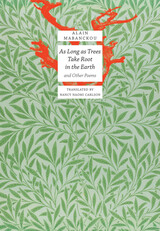
As Long As Trees Take Root in the Earth
and Other Poems
Alain Mabanckou
Seagull Books, 2021
A hopeful, music-infused poetry collection from Congolese poet Alain Mabanckou.
These compelling poems by novelist and essayist Alain Mabanckou conjure nostalgia for an African childhood where the fauna, flora, sounds, and smells evoke snapshots of a life forever gone. Mabanckou’s poetry is frank and forthright, urging his compatriots to no longer be held hostage by the civil wars and political upheavals that have ravaged their country and to embrace a new era of self-determination where the village roosters can sing again.
These music-infused texts, beautifully translated by Nancy Naomi Carlson and supported by a grant from the National Endowment for the Arts, appear together in English for the first time. In these pages, Mabanckou pays tribute to his beloved mother, as well as to the regenerative power of nature, and especially of trees, whose roots are a metaphor for the poet’s roots, anchored in the red earth of his birthplace. Mabanckou’s yearning for the land of his ancestors is even more poignant because he has been declared persona non grata in his homeland, now called Congo-Brazzaville, due to his biting criticism of the country’s regime. Despite these barriers, his poetry exudes hope that nature’s resilience will lead humankind on the path to redemption and reconciliation.
These compelling poems by novelist and essayist Alain Mabanckou conjure nostalgia for an African childhood where the fauna, flora, sounds, and smells evoke snapshots of a life forever gone. Mabanckou’s poetry is frank and forthright, urging his compatriots to no longer be held hostage by the civil wars and political upheavals that have ravaged their country and to embrace a new era of self-determination where the village roosters can sing again.
These music-infused texts, beautifully translated by Nancy Naomi Carlson and supported by a grant from the National Endowment for the Arts, appear together in English for the first time. In these pages, Mabanckou pays tribute to his beloved mother, as well as to the regenerative power of nature, and especially of trees, whose roots are a metaphor for the poet’s roots, anchored in the red earth of his birthplace. Mabanckou’s yearning for the land of his ancestors is even more poignant because he has been declared persona non grata in his homeland, now called Congo-Brazzaville, due to his biting criticism of the country’s regime. Despite these barriers, his poetry exudes hope that nature’s resilience will lead humankind on the path to redemption and reconciliation.
[more]

Calazaza's Delicious Dereliction
Suzanne Dracius
Tupelo Press, 2015
In her polyphonic poems, Suzanne Dracius creates protagonists—usually calazazas, light-skinned mulatto women with red or blond hair—who fight like Amazons against racial and gender discrimination. Dracius’s voice is leaping and exalted, often sexually charged, and infused with allusions to Greek and Roman mythology. Nancy Naomi Carlson has translated Dracius’s Exquise déréliction métisse, poems written in French yet including some Creole versions, and with Creole expressions sprinkled throughout. In French, this book was awarded the prestigious Prix Fètkann, whose judges cited the poet’s richness of language, with varied linguistic registers.
[more]
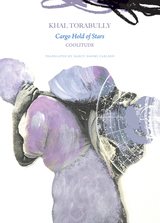
Cargo Hold Of Stars
Coolitude
Khal Torabully
Seagull Books, 2020
Cargo Hold of Stars is an ode to the forgotten voyage of a forgotten people. Khal Torabully gives voice to the millions of indentured men and women, mostly from India and China, who were brought to Mauritius between 1849 and 1923. Many were transported overseas to other European colonies. Kept in close quarters in the ship’s cargo hold, many died. Most never returned home.
With Cargo Hold of Stars, Torabully introduces the concept of ‘Coolitude’ in a way that echoes Aimé Césaire’s term ‘Negritude,’ imbuing the term with dignity and pride, as well as a strong and resilient cultural identity and language. Stating that ordinary language was not equipped to bring to life the diverse voices of indenture, Torabully has developed a ‘poetics of Coolitude’: a new French, peppered with Mauritian Creole, wordplay, and neologisms—and always musical. The humor in these linguistic acrobatics serves to underscore the violence in which his poems are steeped.
Deftly translated from the French by Nancy Naomi Carlson, Cargo Hold of Stars is the song of an uprooting, of the destruction and the reconstruction of the indentured laborer’s identity. But it also celebrates setting down roots, as it conjures an ideal homeland of fraternity and reconciliation in which bodies, memories, stories, and languages mingle—a compelling odyssey that ultimately defines the essence of humankind.
With Cargo Hold of Stars, Torabully introduces the concept of ‘Coolitude’ in a way that echoes Aimé Césaire’s term ‘Negritude,’ imbuing the term with dignity and pride, as well as a strong and resilient cultural identity and language. Stating that ordinary language was not equipped to bring to life the diverse voices of indenture, Torabully has developed a ‘poetics of Coolitude’: a new French, peppered with Mauritian Creole, wordplay, and neologisms—and always musical. The humor in these linguistic acrobatics serves to underscore the violence in which his poems are steeped.
Deftly translated from the French by Nancy Naomi Carlson, Cargo Hold of Stars is the song of an uprooting, of the destruction and the reconstruction of the indentured laborer’s identity. But it also celebrates setting down roots, as it conjures an ideal homeland of fraternity and reconciliation in which bodies, memories, stories, and languages mingle—a compelling odyssey that ultimately defines the essence of humankind.
[more]
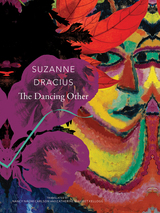
The Dancing Other
Suzanne Dracius
Seagull Books
The Dancing Other takes readers to France and Martinique to reveal the struggles of people who belong both places, but never quite feel at home in either. Suzanne Dracius tells the story of Rehvana, a woman who feels she is too black to fit in when living in mainland France, yet at the same time not dark-skinned enough to feel truly accepted in the Caribbean. Her sense of dislocation manifests itself at first in a turn to a mythical idea of Mother Africa; later, she moves to Martinique with a new boyfriend and thinks she may have finally found her place—but instead she is soon pregnant, isolated, and lonely. Soon her only reliable companion is her neighbor, Ma Cidalise, who regales her in Creole with supernatural tales of wizards. Rehvana, meanwhile, watches her dream of belonging fade, as she continues to refuse to accept her multicultural heritage.
[more]

Delicates
Wendy Guerra
Seagull Books, 2023
Poems from a critically acclaimed Cuban writer available in English for the first time.
Imbued with a sensuality reminiscent of the work of Anaïs Nin, Wendy Guerra’s Delicates takes readers on an exhilarating journey through the cities of love, where women leave their bodies “in the showers of men,” marking their territory “like animals in heat,” their panties “saturated with sand and a sidereal isolating odor.” Guerra’s shocking metaphors and images invite us to enter her gallery of striking and provoking poems where we witness a flight through the air from a thirty-fourth-story window and a woman’s pilgrimage to the salt flats “to taste the pink in stones” on her lover’s behalf. Guerra’s relationship with her native Cuba—much like her relationships with men—is complex and multilayered. Her work confronts the realities of a political system that doesn’t celebrate artistic freedom. Here we have a new way of looking at a woman, an artist, a country, and the colonizers of that country. In these music-infused poems, Guerra shares with us her hard-won truths.
Imbued with a sensuality reminiscent of the work of Anaïs Nin, Wendy Guerra’s Delicates takes readers on an exhilarating journey through the cities of love, where women leave their bodies “in the showers of men,” marking their territory “like animals in heat,” their panties “saturated with sand and a sidereal isolating odor.” Guerra’s shocking metaphors and images invite us to enter her gallery of striking and provoking poems where we witness a flight through the air from a thirty-fourth-story window and a woman’s pilgrimage to the salt flats “to taste the pink in stones” on her lover’s behalf. Guerra’s relationship with her native Cuba—much like her relationships with men—is complex and multilayered. Her work confronts the realities of a political system that doesn’t celebrate artistic freedom. Here we have a new way of looking at a woman, an artist, a country, and the colonizers of that country. In these music-infused poems, Guerra shares with us her hard-won truths.
[more]

Hammer with No Master
Poems of René Char (French and English Edition)
René Char
Tupelo Press, 2016
In his foreword to Stone Lyre, Nancy Naomi Carlson’s previous collection of René Char translations, Ilya Kaminsky praised “the intensity, the dream-like language, the gravity of tone, and the constant impression that one is reading not words in the language, but sparks of flames.”
Stone Lyre was a selection of poems from Char’s numerous volumes of poems; Carlson’s new Hammer with No Master is a discrete and continuous work, the first English translation of Char’s Le marteau sans maître, first published in 1934 — a time of rumbling menace that our time resembles.
Stone Lyre was a selection of poems from Char’s numerous volumes of poems; Carlson’s new Hammer with No Master is a discrete and continuous work, the first English translation of Char’s Le marteau sans maître, first published in 1934 — a time of rumbling menace that our time resembles.
[more]
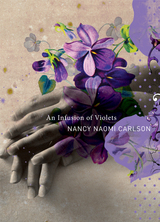
An Infusion of Violets
Nancy Naomi Carlson
Seagull Books, 2019
Using the same musical sense of language she applies to her translations, Nancy Naomi Carlson masterfully interprets herself in An Infusion of Violets. The sometimes erotic, sometimes melancholy landscapes she creates as the self-appointed sitar’s “ragged throat, pitched / between here and when, / caught in quartertones,” take our breath away. Carlson describes an interior world where tears can produce “so much salt a body floats away,” where “music tuned to loss descends with rain,” and where hope is placed in the “kill-cure.” Here we encounter Carlson’s ex-husbands and luminaries such as Rachmaninoff and Monet, among others. Filled with striking images and sensuous language, An Infusion of Violets is an evocative mix of formal and free-verse poems.
[more]

Naming the Dawn
Abdourahman A. Waberi
Seagull Books, 2018
The poems in this new volume by Abdourahman A. Waberi are introspective and inquisitive, reflecting a deep spiritual bond—with words, with the history of Islam and its great poets, with the landscapes those poets walked, among which Waberi grew up. The sage yearns here for the simplicity of each individual moment to somehow become eternal, for the histories and people that are part of him—his mother, his wife, his unborn child, the sacred texts that ground his being—to come together harmoniously within him, and to emerge through his words. Lyrical and personal, but with powerful historical and cultural resonances, these poems are the work of a master at the height of his powers.
[more]
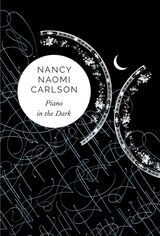
Piano in the Dark
Nancy Naomi Carlson
Seagull Books, 2023
Poetry from an especially deft magician of words.
This latest book of wonders from Nancy Naomi Carlson fixes upon one of the few defenses we have to confront the body’s betrayals—our words. Though in the end, even the world’s last word “forgets its name . . . has no word for this forgetting.” At once vulnerable and open, tempered and tempted equally by the erotic and the empathic, such dualities limn these affectingly beautiful and lyrical poems. Carlson’s lines, entreating as Scheherazade, “weave chords / into tales within tales, whirlpools within seas” to save her life. Indeed, music has no need for voice or harp, as “in anechoic chambers, you become / the only instrument of your worldly sounds,” echoing Mozart’s credo “that music lies / in the silence between notes.” In a world scarred by pandemics, wars, and violent tribalism, the givens are gone—“talismans we clung to, believing / we might be spared in some way / by marking our doors / with our own sacrificial blood.” In these unflinching free and formal verse poems, Carlson seduces us with the promise of the joy yet to be had, were we to look in the right places.
This latest book of wonders from Nancy Naomi Carlson fixes upon one of the few defenses we have to confront the body’s betrayals—our words. Though in the end, even the world’s last word “forgets its name . . . has no word for this forgetting.” At once vulnerable and open, tempered and tempted equally by the erotic and the empathic, such dualities limn these affectingly beautiful and lyrical poems. Carlson’s lines, entreating as Scheherazade, “weave chords / into tales within tales, whirlpools within seas” to save her life. Indeed, music has no need for voice or harp, as “in anechoic chambers, you become / the only instrument of your worldly sounds,” echoing Mozart’s credo “that music lies / in the silence between notes.” In a world scarred by pandemics, wars, and violent tribalism, the givens are gone—“talismans we clung to, believing / we might be spared in some way / by marking our doors / with our own sacrificial blood.” In these unflinching free and formal verse poems, Carlson seduces us with the promise of the joy yet to be had, were we to look in the right places.
[more]
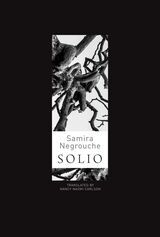
Solio
Samira Negrouche
Seagull Books, 2024
Poetry that serves as an evocative portrayal of diverse landscapes and cultures.
In these otherworldly poetry sequences, Samira Negrouche reminds us that “all life is movement,” where “time passes through me / beings pass through me / they are me / I am them.” The “I” is representative of one voice, three voices, all voices, all rooted in movement as their bodies brush past one another, brush against thresholds of time and space. Everything is in flux—including the dream-like landscapes at the borders of borders—as the poet seeks to recover parts of self and memory, on both a personal and universal level. In these poems, history-laden locales such as Algiers, Timbuktu, N’Djamena, Cotonou, Zanzibar, Cape Town, and Gorée are evoked. Even the language, expertly and sensitively translated by Nancy Naomi Carlson, refuses to be pinned down, as it loops back on itself. At times contradictory, at times fractured in meaning, syntax, and diction, the playful language is riddled with “restless” verbs. In the end, the “I” takes on prophetic overtones, instilling hope for the future.
In these otherworldly poetry sequences, Samira Negrouche reminds us that “all life is movement,” where “time passes through me / beings pass through me / they are me / I am them.” The “I” is representative of one voice, three voices, all voices, all rooted in movement as their bodies brush past one another, brush against thresholds of time and space. Everything is in flux—including the dream-like landscapes at the borders of borders—as the poet seeks to recover parts of self and memory, on both a personal and universal level. In these poems, history-laden locales such as Algiers, Timbuktu, N’Djamena, Cotonou, Zanzibar, Cape Town, and Gorée are evoked. Even the language, expertly and sensitively translated by Nancy Naomi Carlson, refuses to be pinned down, as it loops back on itself. At times contradictory, at times fractured in meaning, syntax, and diction, the playful language is riddled with “restless” verbs. In the end, the “I” takes on prophetic overtones, instilling hope for the future.
[more]
READERS
Browse our collection.
PUBLISHERS
See BiblioVault's publisher services.
STUDENT SERVICES
Files for college accessibility offices.
UChicago Accessibility Resources
home | accessibility | search | about | contact us
BiblioVault ® 2001 - 2024
The University of Chicago Press









